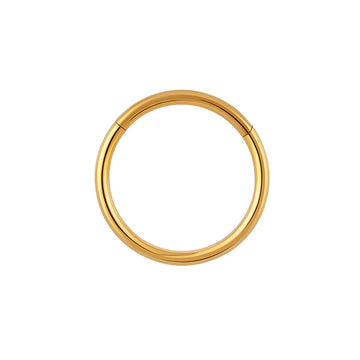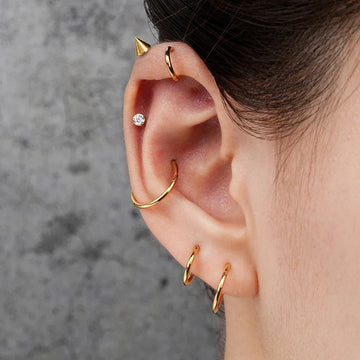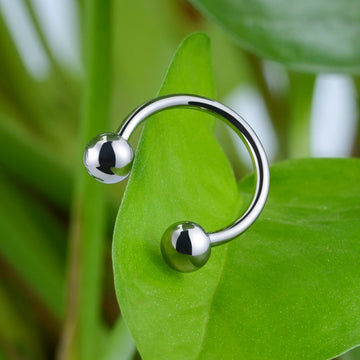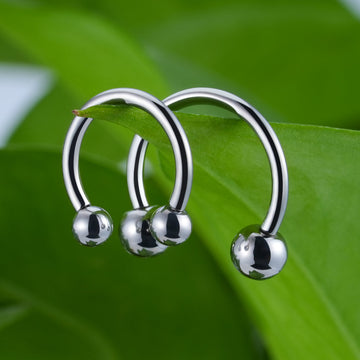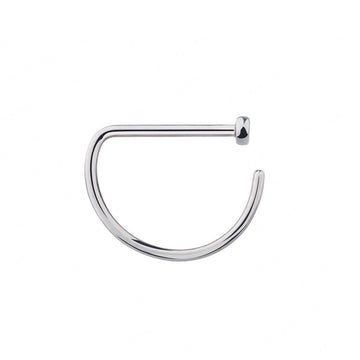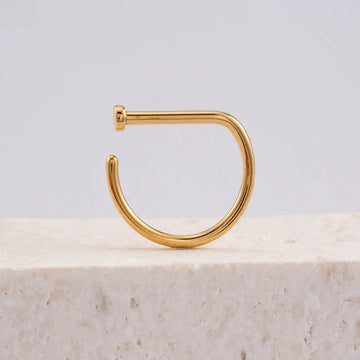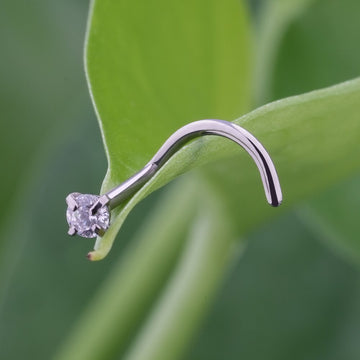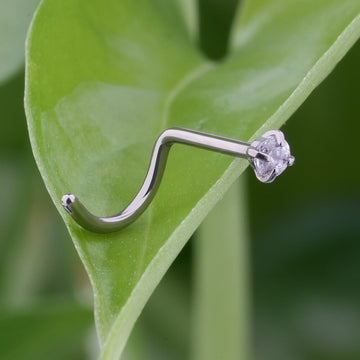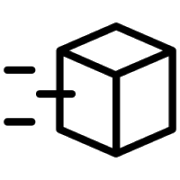Double Nose Piercing: Pain, Cost, Healing, Pros, Cons, and Suitable Jewelry
Aug 05, 2025
Many consider nose piercings a new trend. In fact, they go back to ancient history. They were commonplace in the Middle East and India as far back as 4,000 years ago. In Australia, aboriginal people wore septum piercings made of bone as far back as 44,000 B.C.
What Is a Double Nose Piercing?
A double nose piercing usually goes through your nostril right where it starts to curve away from your face. You can have two piercings on the same nostril or on opposite sides.
Just like a single Nostril piercing, each one is not particularly painful. It is one of the least painful nose piercings and takes a shorter time to heal than more complex piercings.
You can use a wide variety of jewelry for double nose piercings, the most common types including rings, studs, and chains. In order to make placement less complicated, it's usually wise to go for thinner studs or rings.
That said, if you choose this option, do your best to go to an experienced piercer. Each piercing needs to be placed carefully. Misplacing them can lead to pain and even nerve damage.
1. Double Nose Piercing Opposite Sides
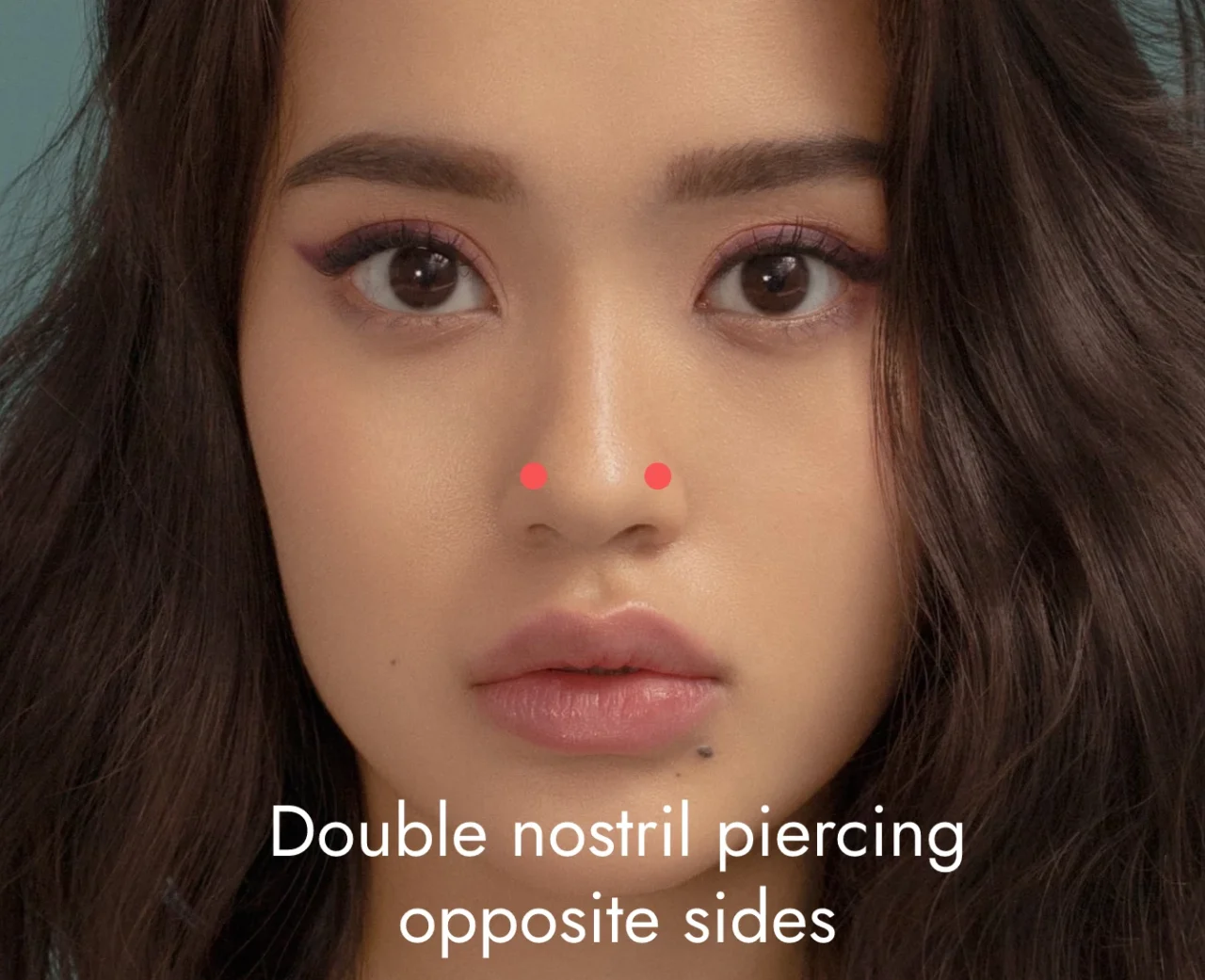
Some people choose to pierce only one nostril. But if you prefer a more symmetrical look, you might decide to pierce both sides.
2. Double Nose Piercing the Same Side
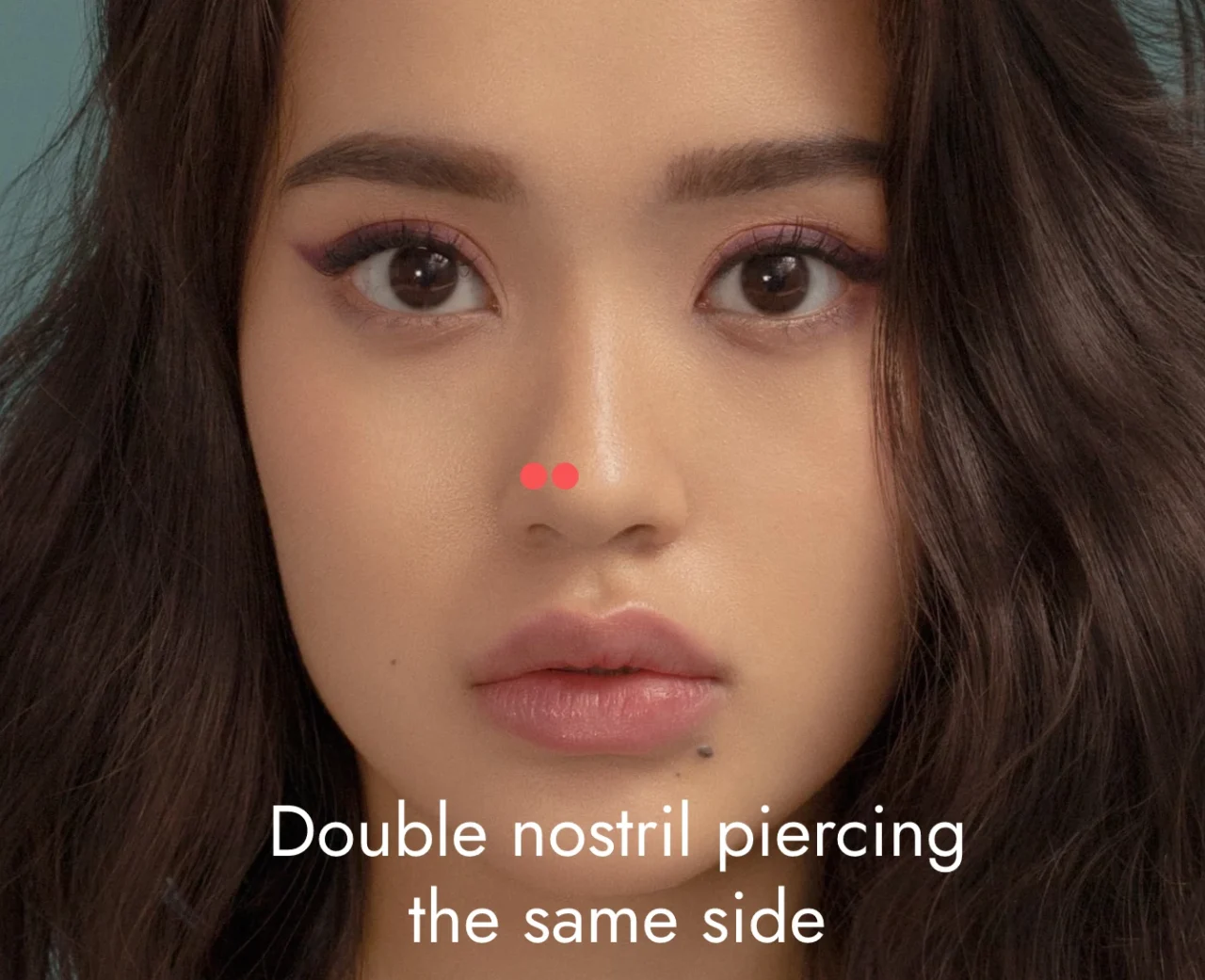
If you get a double nose piercing on the same side, you can have them on your left or right nostril. There is no protocol. It is totally up to you.
Double Nose Piercing Pros and Cons
Pros
- Popular and common
- One of the least painful nose piercings
- It takes a shorter time to heal, i.e., 2-4 months. Other nose piercings like the Nasallang piercing can take nine months or even longer to heal.
- Cheaper than more complex piercings like Septril piercings
- You can use a wide variety of jewelry for double nose piercings
- Easier to clean than more complex piercings
Cons
- Potential risks involved, just like other types of nose piercings
How Much Is a Double Nose Piercing?
Prices will vary widely based on location. But most nose piercings range from $25-$95. Generally speaking, Nostril piercings tend to be on the cheaper end. More complex piercings like septril piercings will usually cost more.
How Painful Is It?
Since everyone has different tolerances for pain, this is a tricky question to answer. Generally speaking, this is one of the least painful nose piercings you can get.
What Does Double Nose Piercing Mean?
Ancient North African tribes used golden nose rings to signify wealth. And in India, women often wore nose rings in the left nostril, believing that it would ease menstrual cramping and make childbirth easier.
Now, nose piercings are often viewed as being somewhat countercultural.
How Long Does It Take for a Double Nose Piercing to Heal?
Healing time is usually only about 2-4 months. It's worth knowing that the area around the piercing is likely to be swollen and red for up to three weeks after the piercing, though.

Double Nose Piercing Jewelry
You can use a wide variety of nose jewelry for double nose piercings, although rings and studs are the most common. In order to make placement less complicated, it's usually wise to go for thinner studs or rings.
1. Double Nose Ring or Hoop

Nose ring hoop 6mm 8mm 10 mm simple and minimalist $15.9, SHOP NOW.
Some rings are just loops of thin metal. Others are what's called "captive bead rings." These are rings that are "sealed" with a bead. Sometimes, the bead is inlaid with a gem to add some visual interest. And in some cases, plain "hoop" nose rings may have a small gem on the side.
Pros:
- They're less likely to become crooked
- There are lots of options, ranging from simple metal hoops to ornately jeweled rings
- They usually remain securely in place
Cons:
- Complex hoops can be hard to close
- Thin hoops can be bent very easily
2. Double Stud Nose Piercing

Cute piercing with natural semi-precious gemstones titanium $25.9, SHOP NOW.
A nose stud looks like a straight stick with a decorative piece on one end, which stays on the outside of the nose, and a small ball on the other end, which has to be pushed into the piercing and stays in the nostril.
Many people like nose studs because they are easy to insert into your piercing.
Pros:
- They heal relatively quickly
- They don't cause much discomfort when resting your head
- They aren't extremely noticeable
Cons:
- They can come out more easily than rings
- If not cleaned regularly, they can get infected
3. Corkscrew Nose Piercing

Corkscrew nose ring with round CZ different colors titanium 20G $19.9, SHOP NOW.
A corkscrew nose ring is made of a metal wire that is twisted into an odd shape, unlike normal nose studs or rings. The combination of straight and circular wire needs specific care to insert it without getting hurt.
4. Double Nose Piercing Chain

Nose piercing chain 0.5mm nose piercing chain $17.9, SHOP NOW.
Chains can be an eye-catching embellishment to nose piercings. Often, a chain will connect a nose ring to an earring. Some chains will connect each end of a double nose piercing across the bridge of the nose.
Pros:
- They have a distinctive look that can really make you stand out
- They're a great way to highlight piercings you already have
- You can easily alternate chains for a different look every day
Cons:
- They can easily snag on clothes, hair, etc.
- Heavier chains can pull on piercings and cause discomfort
Recommended Materials for Double Nose Piercings
1. Implant-Grade Titanium

Rosery Poetry Implant-grade titanium nose stud with round CZ titanium $15.9, SHOP NOW.
Titanium is an element that is completely hypoallergenic, so it's probably the best material for nose piercings, especially if you have sensitive skin.
Implant-grade titanium is the purest form and will not change or corrode if it's exposed to skin or bodily fluids. Implant-grade titanium jewelry is durable, hypoallergenic, nickel-free, and non-corrosive.
Price Range: About $10-$20.
Pros:
- Approved by the Association of Professional Piercers
- Won't cause allergic reactions
- Is scratch-resistant and won't fade
Cons:
- Not as valuable as gold, silver, or platinum
- Doesn't sparkle quite as much as other metals
2. 14K or 18K Gold

14K gold nose ring hoop seamless ring $89.9, SHOP NOW.
If you're looking for a glittering, valuable metal for your piercing, either 14K or 18K gold may be your answer.
It is also one of the metals for piercings that are highly recommended not only by piercing experts but also by doctors. Its excellent quality of being inert makes it suitable for first piercings.
However, gold is a fairly soft metal, so it doesn't stand up to scratches and excessive wear. Compared to 14K gold, 18K gold is more prone to being affected by everyday use, as it is softer and is closer to being pure 24K gold.
Both of these metals include other metal types in order to make them stronger. In order to avoid skin reactions, look for nickel-free metals.
Price Range: About $30-$200.
Pros:
- One of the most valuable materials
- Will not easily tarnish
- Offers plenty of sparkles
- Is easy to engrave or use to set stones
Cons:
- May contain non-hypoallergenic metals
- 18K gold in particular is not very scratch-resistant
3. Platinum
Platinum is a precious metal, so it's one of the pricier options on the list. It's completely hypoallergenic, so it's safe for even very sensitive skin. Its brilliant luster makes it a good choice for those seeking a sparkly, high-end look.
Price Range: About $40-$200.
Pros:
- Hypoallergenic and non-reactive
- Has a brilliant shine
- Is a very valuable material
Cons:
- Is a lot heavier than other metals
- It's uncommon, so your jewelry choices might be limited
4. Surgical Stainless Steel
Lots of new piercings are done in stainless steel. This material is affordable and typically doesn't cause reactions. However, it contains a small amount of nickel, so if you have a nickel allergy, it might be best to choose something else.
It is incredibly resistant to corrosion and will keep its shine for years.
If you're considering steel, 316L or 316 LVM steel is probably your best choice. Both names stand for the same surgical steel material, but the "VM" stands for"vacuum melt," or the way the steel is produced.
Price Range: About $10-$40.
Pros:
- Very affordable
- Common enough that you'll have plenty of jewelry choices
- Extremely durable and resistant to damage and corrosion
Cons:
- May cause reactions in those with nickel allergies
- Not considered as valuable as some other materials
How to Care for Double Nose Piercings?
- Be gentle when blowing your nose. Blowing your nose too hard can irritate the piercing site and slow down the healing process. Be gentle when blowing your nose, and avoid using tissues or other materials that may get caught on the jewelry.
- Take care to avoid contaminating the piercing.
- Avoid touching it or applying makeup very close to it.
- Avoid getting in the water that might be dirty.
- Clean your piercing twice per day using a saline solution made for wound cleaning or soap and water to prevent infection.
- Avoid ointments as they prevent necessary air circulation.
- And of course, make sure to avoid snagging on clothes or towels.
- Wear loose clothing. Avoid wearing tight clothing or clothing that may rub against the piercing, as this can cause irritation and slow down the healing process.
- Use hypoallergenic jewelry like implant-grade titanium and 14- or 18-karat gold. Surgical-grade steel may contain small amounts of nickel that could cause allergic reactions.
- Don't move the piercing unless you're cleaning it. Pulling on a piercing early in healing is painful, but it also can get in the way of healing or damage the piercing itself.
- Wait until your piercing heals before changing out your jewelry.
- Watch for potential signs of infection and consult your piercer or doctor if it becomes infected.
You should ensure you get pierced by someone experienced and reliable who utilizes the right cleaning and sterilization procedures. You’ll also need to choose high-quality jewelry that you aren’t allergic to. After you get your piercing, be sure to follow all instructions from your piercer.
How to Clean Double Nose Piercings?
It is recommended to use sterile saline that you buy from the store, rather than homemade saline, for cleaning your piercings. Homemade saline may be too salty for delicate piercing sites, leading to dryness and delayed healing.
Using mild, fragrance-free soap and water to clean your piercing site is also an option.
If you prefer a homemade salt solution. You can start by mixing 1/2 teaspoon of non-iodized salt with one cup of distilled or boiled (for at least 20 minutes) water. You may choose to use less of the salt mixture, like 1/4 to 1/8 teaspoon, if you want a weaker solution that’s less likely to burn or sting. Stir the solution until it dissolves.
If you see signs of infection, you can also use antiseptic solutions, such as betadine, isopropyl alcohol, or diluted hydrogen peroxide. However, avoid using them for daily cleaning as they can damage cells.
Then, proceed with the following steps to clean your piercing:
- Soak a cotton ball, a paper towel, or a non-plush cloth with the solution. Avoid fabrics that could snag and pull the jewelry or leave fibers behind. Gently saturate the piercing and cleanse it. Don't remove the jewelry!
- If you have a sterile saline wound wash that you buy from stores, then spray it while healing.
- Ensure you cleanse the piercing of any discharge or crusty material.
- Take clean gauze or cotton swabs and pat the area dry.
Your piercer should give you detailed instructions on how to keep your piercing clean once it has been placed.
Read More
9 most common types of nose rings, studs and chains with pictures













